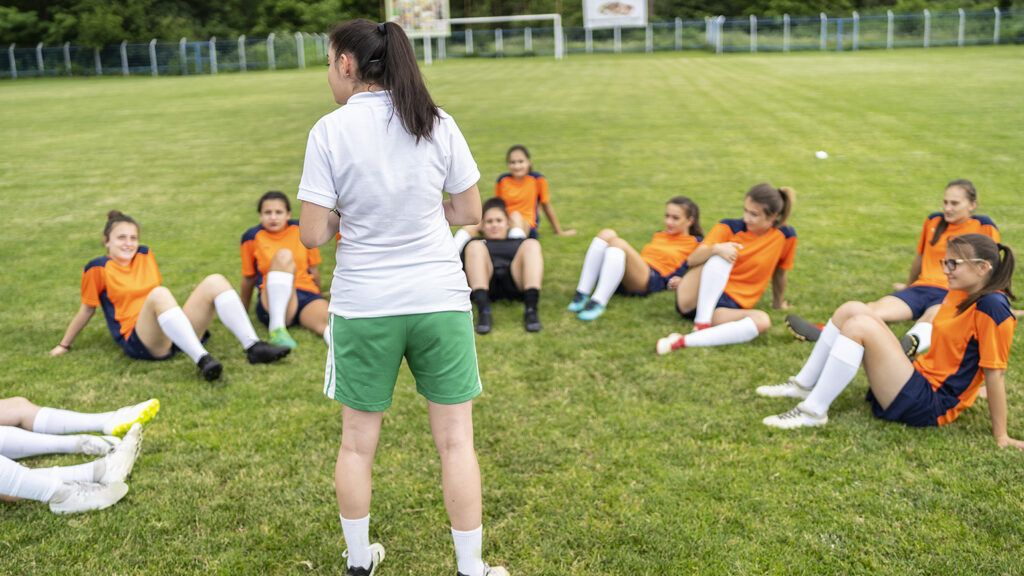By the time I hit my late 40s, life felt like it had reached a plateau.
I’d married in my teens, and now my kids were grown and I was divorced, living alone in a small, quiet condo. I was still teaching history at Curtis High School on Staten Island, just a few miles from where I’d grown up.
I’d been a teacher for 17 years. I loved teaching, considered it my calling to impact my students’ lives. Lately, though, it hadn’t felt that way. Curtis had changed a lot. Staten Island had changed.
Gone was the bucolic, semi-rural suburb with a view of teeming Manhattan. The island was packed and so was Curtis, with 3,000 students in a school designed for 1,600. Classes were big, the halls were crowded, days were hectic. I was running at full steam. Maybe beyond full steam.
It was at the start of that school year that I noticed the flyer posted in the school office: “Boys soccer coach needed.” I didn’t pay much attention. I didn’t know a thing about soccer. The closest I’d come to sports was working the food booth for my boys’ Little League teams way back when.
The next day the note was still there. And the day after. A week went by. Finally I asked about it. The previous coach was busy with the girls’ basketball team. No one seemed to want the job. The athletic director, Hank Butka, was planning to cancel the season.
I could have walked away. But for some mysterious reason—almost as if my feet had a mind of their own—I found myself heading to Hank’s office.
“You’re really going to cancel the season?” I asked him.
“If no one takes the job,” he said. He didn’t look too happy about it.
The words came out of my mouth before I knew what I was saying. “I’ll do it.”
Hank looked at me funny. “Joyce, you don’t know a thing about soccer, do you?”
“No, but I know I can learn,” I said.
“Have you ever played?” he asked.
“Um, no. But I know some other local coaches. I’ll talk to them.”
Hank wavered. “Your first game’s in two weeks. The kids don’t even have uniforms yet. You sure you’re up for this?”
I nodded, trying to mean it.
A few days later, after a trip to a sporting goods store for uniforms and books on soccer, I called the team into my office. Luckily, there were nine returning seniors. Maybe they could help teach the younger kids.
The boys slouched and milled around the office. They were from a medley of nations—Egypt, Pakistan, Bahamas, Honduras, Guatemala, Mexico, Poland, Costa Rica, Vietnam, Jamaica and one kid from Staten Island.
“Where’s the coach?” Aldo Santos, from Honduras, asked.
“You’re looking at her,” I said.
Everyone froze. Twenty-three pairs of eyes locked on me.
“A woman?” burst out Aldo. He looked around, as if waiting for someone to tell him it was a joke. Silence. He snorted and stalked from the room. I let him go.
“We’re practicing this afternoon,” I said. “And every day this week. We have a game coming up.”
“Um, Miss,” someone mumbled. “We never practiced on school days before. Only before games.”
“Well, maybe that’s why this team has never had a winning season. Look, I’ll be honest with you all. I don’t know a lot about soccer. But I know about learning. And we’re going to have to work—and learn—together this year. So let’s stop talking and start playing.”
There was some exasperated muttering, but everyone filed out onto the field. I began some passing drills and right away noticed something strange. The boys seemed very good—they all came from countries where kids start kicking soccer balls as soon as they can walk—but they never used each others’ names. It was always, “Hey, red shirt!” “Yo, curly hair!” I called them together. “Doesn’t anyone know anyone else’s name?” They shook their heads. I ordered them to introduce themselves and assigned each boy a running partner.
That raised a new problem. “Miss, I can’t be with him. He’s Egyptian.”
“What’s wrong with that?”
“I’m from Honduras. We don’t speak the same language. I’m not going to pass to him.”
The other boys had similar objections.
I put my hands on my hips. “That is not acceptable. If I see anyone refusing to pass to someone from another country, I’m pulling you off the field. I don’t care how good you are. Is that clear?”
They sulked through the rest of the practice. Aldo turned up and joined in, his attitude even worse. By the time I got home, I was exhausted. Crawling into bed, though, I realized I’d been so busy thinking about the day and planning the next practice, I hadn’t noticed the quiet of my condo. It was like the kids were still with me.
Slowly, the team got better. Like I warned, I pulled kids off the field for refusing to pass. That got their attention. Then we won a game and complaints tailed off. We won a second game and I stopped hearing comments about being a woman coach.
One day, Aldo shyly asked if I could give him a ride home. How surprised was I to discover he lived in the same condo complex? I dropped him off and told him I was going to park my car. “It’s okay, Miss, you don’t have to come in with me.”
“Aldo, I live here.”
His eyes widened. A few minutes later he knocked on my door. “Um, Miss, my family’s all out working. Would it be okay if I did some homework here?” Not a problem, I said, and soon my condo became Aldo’s unofficial study hall.
A local newspaper, noticing we were winning, started covering our games. “Soccer Success Starts with Simonson.” I posted the stories on a bulletin board and the boys pored over them, shouting excitedly when they saw their names.
A film student from a nearby community college asked if she could make a documentary about the team. I said sure, as long as I could show footage to the boys. I bought pizza and popcorn and held film sessions in my office. The boys loved it, hooting at every pass and goal. They got along so well, I decided to try taking them bowling one weekend. They bowled about as well as I passed a soccer ball. We had a fantastic time.
One Saturday, three of the boys showed up at my place. By this point, I wasn’t at all surprised by these visits. My condo, once so quiet, was now filled most afternoons and weekends with boisterous soccer players. Steven, one of my forwards from Guatemala, and Jack and Michael, both Polish defenders, announced they wanted to take my Mercury Sable to be cleaned.
“We don’t mean to be rude, Miss, but your car stinks,” said Steven. “It smells like soccer balls and sweat.” I couldn’t argue with that, so I gave them the keys. A few hours later they returned, my car looking like new. “Don’t worry about it,” they said. “You think we could come in and watch a movie?”
We had made it to the playoffs. Then the semifinals. Then, to everyone’s amazement, we were in the league championship, playing Lincoln High School in Brooklyn, a New York soccer powerhouse.
More than 200 people showed up at the Lincoln stadium, including a stunned Hank Butka. The boys played brilliantly, passing with confidence, working as a team. When the clock ran down, the score was tied 1-1 and the game went to overtime. Then to a second overtime. Finally, the winner was to be decided by a penalty shootout.
The shots went back and forth, neither side scoring. Then Lincoln scored. We had to score or it was over. The ball was lined up, shot toward the goal—and missed. The crowd gasped. My heart fell. Then suddenly I saw my boys cheering. They were running around the field, hoisting their second-place trophy as if they’d won the championship. They surrounded me and swept me along, and it hit me: They had won.
No Curtis team had ever come so far. Not anywhere near! Those boys had never made such good friends, never in their adopted country found such a home.
And neither, I suppose, had I. I often think back to that day I walked into Hank Butka’s office and took on a job I knew nothing about. I felt compelled to do it, as if some mysterious force pushed me there, pushed me off my plateau and into a life I could never have imagined. Nineteen years later, I’m still grateful. That’s how long I’ve been the soccer coach at Curtis High School. Or maybe I should say, “Miss” Coach, like my kids call me.
I’m such a mom to them, I even became the legal guardian of one of my players, a West African immigrant named Tombo Berete, whose parents sent him to the United States to escape civil war in his native country. He’s now grown up, married with kids—and working as my assistant coach.
These days my car still smells like soccer balls—and the sweaty soccer players I drive all over town. I actually retired from teaching in 2005. But not from coaching.
My day doesn’t really begin until I pull on my Reeboks, my white-and-maroon Curtis Warriors sweatshirt and the matching windbreaker that says “Coach Simonson” across the back. I pull out my keychain with the whistle attached and head to the soccer field, perched on a hill above New York harbor. The breeze blows fresh up there. Fresh like the game that gave this old teacher such new—and wonderful—life.






